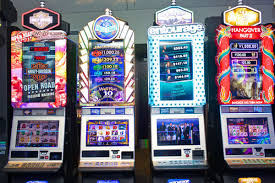Psychologically speaking, virtual slot machines now serve the same functions for players as the mechanical ‘one-armed bandits’ of the past. The more we understand what makes slot games so addictive, the more likely we’ll be able to approach these games in a responsible manner and thus avoid succumbing to gambling addiction.
Psychologists’ ‘inside view’ of the player experience can be used to shed light on real-time player behaviour, with the aim of informing the development of more responsible game designs.
Reels
Game slot machines induce what scholars call an ‘alphabetic state’, a temporal vacuum in which time vanishes in the presence of an entirely absorbing endeavour that, through positive reinforcement and speed, enables its subject to lose track of sunk costs simultaneously and thoughtlessly.
Combined with the unpredictability of outcomes in most games, these factors can create conditions that are conducive to addiction. The inclusion of auditory stimuli, like win sounds or music, can also influence a player’s emotional state, leading to reduced decision-making.
Slots are also addictive because they allow no prolonged dry spells. Each near miss fires the brain’s reward system, flooding it with Dopamine. Alcohol and drugs do the same. But human desire for control plays its own evil role.
Symbols
This constant coming and going might be a product of variable reward, a near miss, or a superstitious desire to counteract a bad luck streak. Whatever the cause, the operators of one-armed bandits have discovered that such psychological mechanisms keep flipping the switches of gamblers’ brains.
These features activate the brain’s reward system, causing dopamine secretion and an immediate ‘reward’. Instant gratification also encourages rapid repeat plays; we would, over time, be looking at mechanisms that establish and conditionalise the ability to play, as though it were an addictive behaviour.
Slots do this by preventing the punter from experiencing too much periods of inaction between individual wins – thus creating anticipation of an ever-greater jackpot prize. Slots also harness random reinforcement schedules that reinforce lever-pushing, which was one of the important discoveries in the field of operant conditioning as developed by the experimental psychologist B F Skinner in the 1960s.
Paylines
Gambling is often confused with risk and uncertainty with thrill and excitement, despite the findings I refer to above. Slot machines are arguably the most addictive form of casino gambling because players are in control of the play and it’s highly predictable.
These provide consistent unpredictability along with variable-ratio reinforcement schedules, which theoretically drive gamblers to continue playing. Chance of winning is an additive feature, which by itself elevates emotional impact.
Discovering what makes players behave in socially responsible ways is central to responsible gaming. With this in mind, we suggest that the next wave of research should focus on the domain-specific cognitive biases present in the depiction of casino games such as game slots and how their presentation alters the decision-making processes of their players – thereby offering guidelines for casino game designers to create more engaging and effective slots games.
Bonus rounds
Unlike other kinds of gambling, slot machines return feedback on a win or loss immediately, triggering the brain’s reward system to fire dopamine, which is why they are so addictive.
They also offer ‘near wins’ by prompting chimings, flashing lights and dolphin chortles on losing spins that appear to be just on the brink of delivering a pay-out. In a study at the University of Waterloo in Ontario, they also showed how virtual reel mapping, a design method where the real positions of symbols on the virtual reel are randomly shuffled, raises the likelihood that a winning symbol will fall near or straddle a win line, leaving the gambler feeling they were so close to a monster jackpot.
Understanding how players interact with the game is essential for designing slot games. Psychologists have a unique perspective on reward responsiveness and impulsivity which can be utilised to spin greater, and more responsible, slots.
Odds of winning
Slot machines are casinos’ – and online gambling sites’ – big draw, generating more than three-quarters of revenue and being highly addictive: people who gamble regularly on video slot or other electronic gaming machines are three to four times more likely to develop gambling disorder than those who play cards or table games.
Through sensory tricks including variable ratio reinforcement and the illusion of control, slot machines exploit enduring neural circuitry to keep patrons playing For instance, variable ratio reinforcement refers to the practice of conditioning responses that trigger brain reward circuits every time the reels of a slot machine stop just short of a bingo – an algorithm that creates an insatiable craving for more, like serving Doritos while watching a movie so that you will continue eating them among other activities. And players are also consistently motivated and engaged by the variable sizes and frequency of rewards.





